

The Future Is Not What It Used To Be. Rear Admiral Bill Rowley April 1995. A History of Freedom of Thought. Return to History page Project Gutenberg's A History of Freedom of Thought, by John Bagnell Bury This eBook is for the use of anyone anywhere at no cost and with almost no restrictions whatsoever. You may copy it, give it away or re-use it under the terms of the Project Gutenberg License included with this eBook or online at www.gutenberg.net Title: A History of Freedom of Thought Author: John Bagnell Bury Release Date: January 11, 2004 [EBook #10684] Language: English Character set encoding: UTF-8 *** START OF THIS PROJECT GUTENBERG EBOOK A HISTORY OF FREEDOM OF THOUGHT *** Produced by Jeffrey Kraus-yao. No. 69 Editors: A History of Life Expectancy in the UK.
We do not know exactly what average life expectancy at birth was in the past (before the 19th century we can only give rough estimates).

However historians think it was about 35 years in the Middle Ages or the 16th Century. (So 50% of the people born reached that age). However that does not mean that people dropped dead when they reached 35! Average life expectancy at birth was around 35 but a great many of the people born died in childhood. We don't know exactly what percentage died but if we say about 25% of people died before they were 5 years old we are probably not wide of the mark. A History of Baths and Showers. Most Tudors cared about their appearance.

People carried mirrors made of glass or steel. They also carried combs and used tweezers, ear scoops and bone manicure sets. A History of Surgery. By Tim Lambert Ancient Surgery In the stone age some adults had holes cut in their skulls.
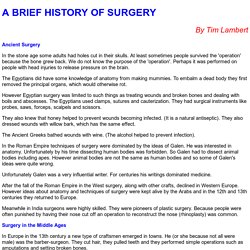
At least sometimes people survived the 'operation' because the bone grew back. We do not know the purpose of the 'operation'. Perhaps it was performed on people with head injuries to release pressure on the brain. The Egyptians did have some knowledge of anatomy from making mummies. However Egyptian surgery was limited to such things as treating wounds and broken bones and dealing with boils and abscesses. They also knew that honey helped to prevent wounds becoming infected. A Brief History of Medicine. During the 18th century medicine made slow progress.
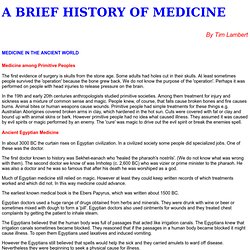
Doctors still did not know what caused disease. Some continued to believe in the four humors (although this theory declined during the 18th century). Other doctors thought disease was caused by 'miasmas' (odorless gases in the air). Life In The 18th century. By Tim Lambert Society in 18th Century Britain In the late 18th century life the industrial revolution began to transform life in Britain.

Until then most people lived in the countryside and made their living from farming. By the mid 19th century most people in Britain lived in towns and made their living from mining or manufacturing industries. From 1712 a man named Thomas Newcomen (1663-1729) made primitive steam engines for pumping water from mines. Meanwhile during the 1700s Britain built up a great overseas empire. Tudor Life. By Tim Lambert In 16th century England most of the population lived in small villages and made their living from farming.

However towns grew larger and more important. During the 16th century trade and industry grew rapidly and England became a more and more commercial country. Life In The 17th Century. By Tim Lambert SOCIETY IN 17th CENTURY ENGLAND During the 17th century the population of England and Wales grew steadily.
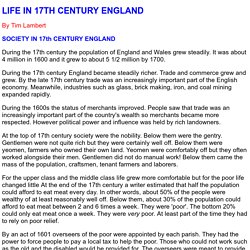
It was about 4 million in 1600 and it grew to about 5 1/2 million by 1700. Women in the 17th Century. In the 17th century the professions (lawyer, doctor) were closed to women.

However some women had jobs. Some of them worked spinning cloth. Women were also tailoreses, milliners, dyers, shoemakers and embroiderers. There were also washerwomen. Some women worked in food preparation such as brewers, bakers or confectioners. However most women were housewives and they were kept very busy.
HistoryBuff.com. Word-Origins.com – History and Etymology of Words. U.S. WWII. Muslim Black Slavery - Islam Slave History of Black Africa - Video - StumbleUpon. Case Closed? Columbus Introduced Syphilis to Europe. In 1492, Columbus sailed the ocean blue, but when he returned from 'cross the seas, did he bring with him a new disease?
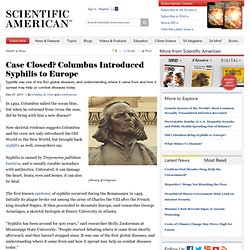
New skeletal evidence suggests Columbus and his crew not only introduced the Old World to the New World, but brought back syphilis as well, researchers say. Syphilis is caused by Treponema pallidum bacteria, and is usually curable nowadays with antibiotics. Untreated, it can damage the heart, brain, eyes and bones; it can also be fatal. Visual History of War, Religion, and Government - StumbleUpon. Teachinghistory.org.
Teaching Social Studies. Reading Like a Historian Curriculum. History. China 1911: The Birth of China's Tragedy. Jonathan Fenby argues that the failings of China's 1911 revolution heralded decades of civil conflict, occupation and suffering for the Chinese people.
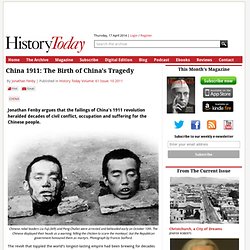
Chinese rebel leaders Liu Fuji (left) and Peng Chufan were arrested and beheaded early on October 10th. The Chinese displayed their heads as a warning, ‘killing the chicken to scare the monkeys’, but the Republican government honoured them as martyrs.